MBA Courses and Full Form of MBA

Image-1 SAITM Campus
The MBA full form represents “Master of Business Administration,” a graduate-level degree offering advanced expertise in diverse areas of business management. This encompasses finance, marketing, operations, and strategy, equipping individuals with valuable skills and knowledge.
Typically pursued after completing a bachelor’s degree and gaining some work experience, an MBA degree equips students with leadership abilities, analytical thinking, and decision-making skills essential for navigating complex business environments. An MBA program is designed to develop leadership skills through strategic coursework, hands-on learning experiences, and networking opportunities.
MBA Graduate often pursue careers in diverse industries, such as consulting, finance, technology, healthcare, and entrepreneurship.
The MBA syllabus typically involves coursework, case studies, group projects, and internships, preparing students for leadership roles and career advancement opportunities.
Some of the most opted courses in India and St. Andrews college or different Engineering college or Management colleges are as follows:-
- Btech
- Btech CSE
- Btech ETCE
- MTech
- BCA
- BBA
- MBA
- MCA
- DPharma – St. Andrews College of Pharmacy
- BPharma – St. Andrews College of Pharmacy
- BArch – St. Andrews College of Architecture
Duration and Structure of MBA
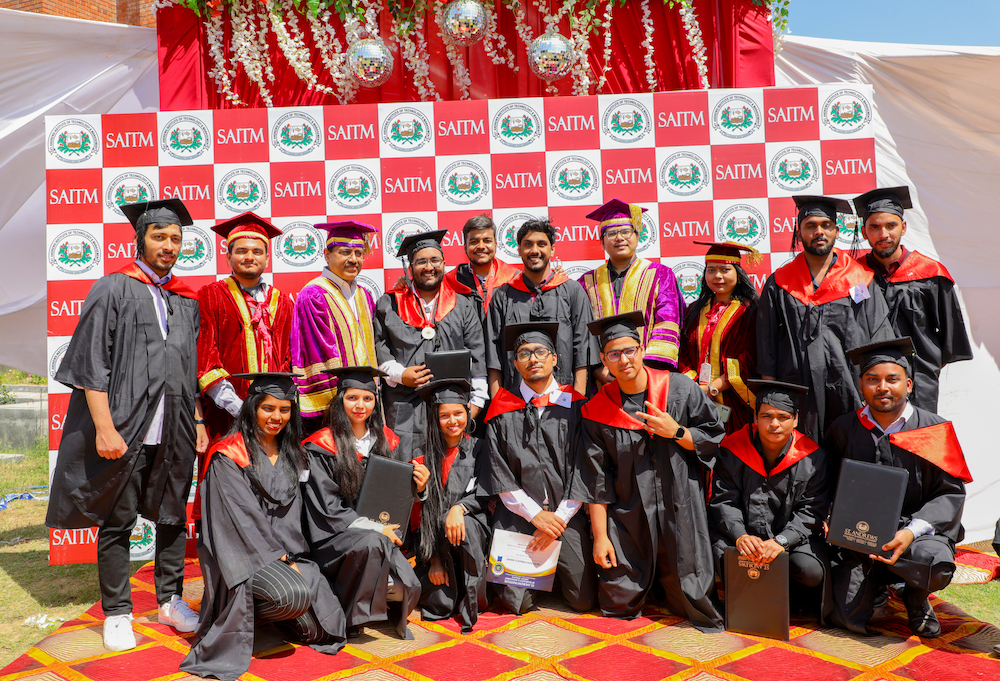
Image – 2 Convocation 2023 at SAITM
The duration and structure of MBA courses can vary depending on the institution offering the degree and the specific format of the program.
However, there are some common characteristics across many MBA programs:
Duration
Typically, the duration of an MBA degree ranges from one to two years. Nevertheless, there are alternatives such as accelerated degrees that may span as short as 10-12 months, or part-time programs that can stretch over several years.
Core Curriculum
The majority of Master of Business Administration (MBA) offerings feature a core curriculum comprising essential business topics like accounting, finance, marketing, operations management, organizational behaviour, and strategy. These foundational courses furnish students with a comprehensive grasp of business principles and methodologies.
Elective Courses
Alongside the fundamental curriculum, MBA studies frequently present a variety of elective courses, enabling students to focus on particular areas of interest like entrepreneurship, healthcare management, sustainable business, or finance. These optional courses empower students to customize their MBA journey according to their professional aspirations.
Experiential Learning
Numerous MBA curricula integrate experiential learning opportunities, encompassing case studies, simulations, consulting projects, internships, or global immersion experiences. These hands-on experiences help students apply theoretical concepts to real-world business challenges and develop practical skills.
Capstone Project or Thesis
Certain MBA paths necessitate students to finalize their studies with a capstone project or thesis. This culmination typically entails tackling a substantial business challenge or conducting innovative research with the support of a faculty mentor.
Internship/Practicum
Numerous MBA pathways promote or mandate students to undertake an internship or practicum. This hands-on experience aids in acquiring practical skills and establishing valuable professional networks within their preferred industry.
Networking Opportunities
MBA pathways frequently offer a multitude of networking opportunities via events, guest speakers, alumni associations, and career services. These networking avenues are instrumental in fostering connections with fellow students, alumni, professors, and professionals within the industry.
MBA Courses Eligibility Criteria

Image – 3 SAITM New Management Block
Eligibility criteria for MBA courses can vary depending on the institution and country, but some common requirements include:
Educational Background
Applicants typically need a bachelor’s degree from a recognized university or college. The undergraduate degree may be in any discipline, although. While some MBA degrees may prioritize candidates with a background in business, economics, or related fields.
Work Experience
While not always mandatory, many MBA programs prefer candidates with some work experience, ranging from a few years to several years, depending on the program. Some programs specifically target applicants with managerial or professional experience.
Standardized Tests
Numerous MBA degree necessitate applicants to furnish scores from entrance exam such as the Common Admission Test (CAT). Certain degrees may also consider alternative tests like the Executive Assessment (EA).
Language Proficiency
For international applicants from non-English speaking countries, proof of English language proficiency through tests like the TOEFL (Test of English as a Foreign Language) or IELTS (International English Language Testing System) may be required.
Letters of Recommendation
Some MBA programs may require applicants to submit letters of recommendation from academic or professional references who can attest to the applicant’s abilities, achievements, and potential for success in the program.
Statement of Purpose or Essays
Applicants may be required to submit a statement of purpose or essays outlining their career goals, reasons for pursuing an MBA, and how they plan to contribute to the program and the business community.
Interviews
Some MBA programs conduct interviews with shortlisted candidates to assess their fit for the program and their potential contributions to the cohort.
Types of MBA Courses

Image – 4 Types of MBA
Some common types of MBA courses include:
Full-time MBA
In traditional two-year MBA degrees, students typically immerse themselves in full-time, on-campus classes. These degrees provide a comprehensive curriculum encompassing various business disciplines.
Part-time MBA
Designed for working professionals who wish to pursue an MBA while continuing their careers. Part-time MBA programs often offer classes in the evenings or on weekends, allowing students to balance work and studies.
Executive MBA (EMBA)
Geared towards mid-career professionals with significant work experience. EMBA programs often feature a condensed format, allowing students to earn their degree while continuing to work full-time. Classes may be held on weekends or in intensive sessions.
Online MBA Degree
Virtual MBA programs, offered entirely or predominantly through virtual platforms, provide flexibility for students who are unable to attend classes on campus due to work or personal commitments. Online MBA programs often utilize virtual classrooms, video lectures, and discussion forums.
Dual/Multiple MBA
Some institutions offer dual or joint MBA programs in partnership with other universities or in combination with other graduate degrees, such as a JD/MBA or MBA/MS in Finance. These programs allow students to earn two degrees simultaneously and gain expertise in multiple disciplines.
Specialized MBA
Focuses on specific industries or functional areas such as healthcare, technology, finance, marketing, or entrepreneurship. These programs provide in-depth knowledge and skills tailored to the chosen field.
Global MBA
Designed for students interested in gaining exposure to the global marketplace, global MBA pathways often integrate opportunities for studying abroad, participating in international exchange programs, and engaging in coursework focused on challenges within the global business landscape.
Mini-MBA
Short-term, non-degree programs that offer a condensed version of MBA curriculum. Mini-MBAs are often designed for professionals seeking to gain fundamental business knowledge or enhance specific skills in a short period.
Accelerated MBA
Intensive programs that allow students to complete their MBA in a shorter duration compared to traditional programs. Accelerated MBAs may require a heavier course load or summer classes to expedite graduation.
Flexible MBA
Programs that allow students to customize their course schedule, curriculum, and learning format according to their preferences and career goals. Flexible MBAs often combine online and on-campus courses, allowing students to tailor their learning experience.
Top Specializations in MBA Courses
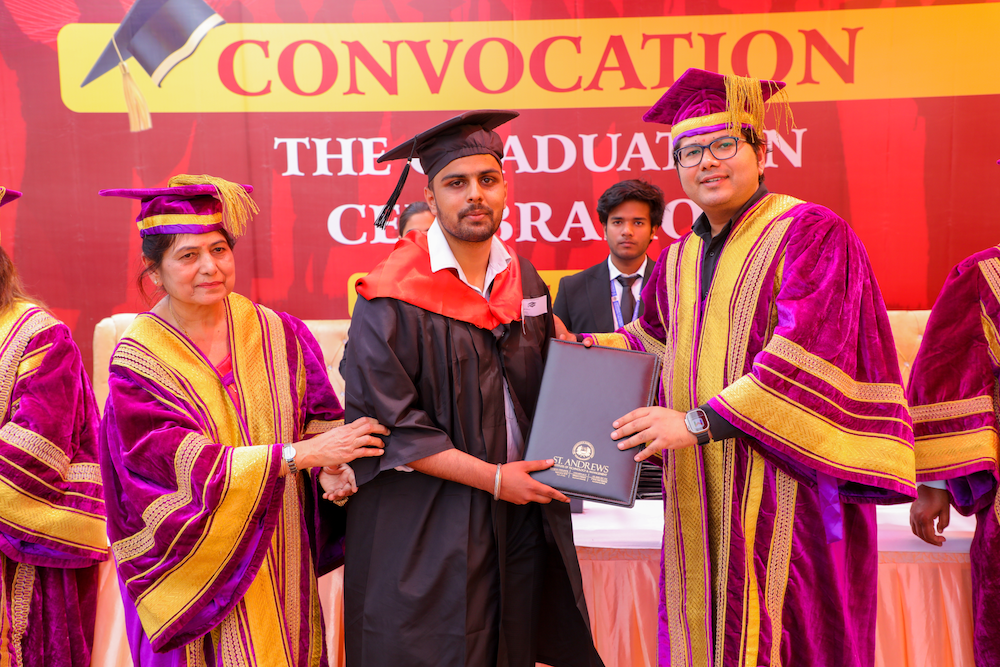
Image – 5 Convocation at SAITM Campus
Some of the top specializations in MBA programs, based on industry trends and demand, include:
Finance
This specialization focuses on financial management, investments, corporate finance, and financial markets. Graduates often pursue careers in investment banking, corporate finance, financial analysis, asset management, or risk management.
Marketing
Marketing specialization covers areas such as consumer behavior, market research, branding, advertising, digital marketing, and product management. Graduates may work in roles such as brand manager, marketing manager, digital marketing specialist, or market research analyst.
Entrepreneurship
Entrepreneurship specialization prepares students to start and manage their own businesses or work in entrepreneurial environments. It covers topics such as business planning, venture capital, innovation, and entrepreneurial finance.
Consulting
Consulting specialization focuses on developing problem-solving, analytical, and communication skills to help organizations solve business challenges. Graduates may work in management consulting firms, providing strategic advice to clients in various industries.
Operations Management
Operations management MBA is the specialization that emphasizes efficient production and service delivery processes, supply chain management, quality management, and project management. Graduates often pursue careers in operations management, logistics, manufacturing, or consulting.
Human Resource Management
HRM specialization focuses on managing people within organizations, including recruitment, training, performance management, compensation, and employee relations. Graduates may work as HR managers, talent acquisition specialists, training and development managers, or organizational development consultants.
Information Technology Management (ITM)
ITM specialization combines business and technology skills to manage IT projects, information systems, cybersecurity, data analytics, and digital transformation initiatives. Graduates may work as IT managers, technology consultants, data analysts, or chief information officers (CIOs).
Healthcare Management
Healthcare management specialization is tailored for those interested in managing healthcare organizations, including hospitals, clinics, pharmaceutical companies, or healthcare consulting firms. It covers topics such as healthcare policy, healthcare finance, healthcare operations, and healthcare marketing.
Sustainability/Corporate Social Responsibility (CSR)
This specialization focuses on integrating environmental, social, and governance (ESG) considerations into business strategy and operations. Graduates may work in sustainability consulting, CSR management, corporate sustainability reporting, or green finance.
Top MBA Colleges Accepting Popular MBA Entrance Exams

Image – 6 Celebration after Placement Drive
Here are some top MBA colleges known for accepting popular MBA entrance exams like CAT (Common Admission Test), XAT (Xavier Aptitude Test) and MAT (Management Aptitude Test):
Indian Institutes of Management (IIMs) : The IIMs are the premier business schools in India and accept CAT scores for admission to their MBA pathways.
XLRI – Xavier School of Management : XLRI accepts XAT scores for admission to its MBA pathways.
S.P. Jain Institute of Management and Research (SPJIMR) : SPJIMR accepts CAT/XAT scores for admission to its MBA pathways.
Indian Institute of Foreign Trade (IIFT) : IIFT is one of the entrance exams managed by IIFT for admission to its MBA pathways.
National Institute of Industrial Engineering (NITIE): NITIE accepts CAT scores for admission to its MBA pathways.
Tata Institute of Social Sciences (TISS): TISSNET is one of the entrance exams managed by TISS for admission to its MBA pathways.
Indian Institutes of Technology (IITs): Some IITs offer MBA programs and accept CAT scores for admission.
Great Lakes Institute of Management: Great Lakes accepts CAT/XAT scores for admission to its MBA pathways.
Highlights- MBA (Master of Business Administration)

Image – 7 SAITM Academic Building
Advanced Business Education
The MBA degree offers comprehensive training in various facets of business administration, encompassing finance, marketing, operations, and strategy.
Leadership Development
Master of Business Administration (MBA) pathways prioritize the development of executive capabilities through experiential learning, case studies, and teamwork.
Networking Opportunities:
Students benefit from extensive networking opportunities with peers, alumni, and industry professionals, fostering valuable connections for their careers.
Specializations
Master of Business Administration (MBA) pathways provide specializations or concentrations, enabling students to concentrate their studies on particular areas such as finance, marketing, or entrepreneurship.
Career Advancement
Graduates of Master of Business Administration (MBA) pathways frequently encounter accelerated career advancement and expanded job prospects, gaining entry to executive-level management positions and leadership roles. Executive MBA programs offer advanced education for experienced professionals aspiring to leadership.
Global Perspective
Master of Business Administration (MBA) pathways frequently integrate international experiences and global business perspectives, equipping graduates for success in an ever more interconnected world.
Practical Learning
Master of Business Administration (MBA) pathways frequently incorporate real-world projects, internships, and consulting opportunities, offering hands-on experience and practical skills relevant to the business environment.
Alumni Network
Those who earn an MBA become part of a prestigious alumni network, offering continual support, mentorship, and career opportunities throughout their professional journeys.
Top Colleges for MBA Courses

Image – 8 SAITM Campus
Here are some of the top colleges for MBA courses in India:
Indian Institutes of Management (IIMs)
The IIMs are the most prestigious management institutes in India with campuses in various cities including Ahmedabad, Bangalore, Calcutta, Lucknow, Indore, and Kozhikode.
Indian Institute of Technology (IITs)
Several IITs offer MBA programs known for their rigorous curriculum and emphasis on innovation and technology management. IIT Bombay’s Shailesh J. Mehta School of Management (SJMSOM) and IIT Delhi’s Department of Management Studies (DMS) are among the top choices.
XLRI – Xavier School of Management, Jamshedpur
It is one of the oldest business schools in India and is renowned for its management programs, particularly in human resources management and industrial relations. XLRI offers a flagship PGDM program along with other specialized MBA programs.
Indian School of Business (ISB), Hyderabad
ISB is a premier business school known for its one-year MBA program, attracting experienced professionals and offering a rigorous curriculum, renowned faculty, and excellent industry connections.
SP Jain Institute of Management and Research (SPJIMR), Mumbai
SPJIMR is known for its unique pedagogy, industry-focused curriculum, and innovative programs such as the PGDM in Family Managed Business (FMB) and the Global Management Program (GMP).
National Institute of Industrial Engineering (NITIE), Mumbai
NITIE is known for its MBA programs specializing in operations and supply chain management, offering a blend of academic rigor and industry exposure.
Skills Required for MBA Course

Image – 9 Project Exhibition at SAITM
Here are some of the essential skills required for MBA courses:
Analytical Skills
Master of Business Administration (MBA) studies frequently entail intricate problem-solving and data analysis. Participants must possess the capability to decipher and scrutinize data, craft well-informed decisions, and formulate strategic resolutions to business hurdles.
Critical Thinking
Critical thinking skills are essential for evaluating information, identifying assumptions, analyzing arguments, and making sound judgments. Those pursuing an MBA must possess the capability to think critically to evaluate business scenarios and devise effective strategies.
Leadership Skills
Leadership skills are essential for MBA candidates to inspire and motivate teams, enact change, and attain organizational objectives. Effective leaders can delegate tasks, manage conflicts, and make difficult decisions while inspiring others to follow their vision.
Teamwork and Collaboration
MBA scholars often work in diverse teams on group projects and case studies. The proficiency to collaborate effectively, actively listen to others, harness diverse perspectives, and contribute to collective goals is vital for success in MBA studies and the professional business arena.
Adaptability and Flexibility
The business environment is constantly evolving, and management students need to be adaptable and open to change. They should be able to thrive in dynamic situations, embrace new technologies, and adjust their strategies in response to shifting market conditions.
Time Management and Organization
MBA studies can be rigorous and challenging, necessitating students to manage multiple assignments, projects, and deadlines concurrently. Strong time management and organizational skills are crucial for prioritizing tasks, staying focused, and meeting deadlines effectively.
Financial Literacy
A basic understanding of finance and accounting principles is essential for management students, even if they don’t specialize in finance. They should be able to interpret financial statements, understand budgeting and forecasting, and make informed financial decisions.
Networking Skills
Building professional relationships and expanding one’s network is an essential part of succeeding in business. management students should be proactive in networking, attending events, and connecting with alumni, faculty, and industry professionals to leverage opportunities and advance their careers.
Ethical and Social Responsibility
Management students should have a strong ethical foundation and a commitment to corporate social responsibility. They should consider the ethical implications of their decisions, prioritize sustainability, and contribute positively to society through their business practices.
What are the types of MBA specializations?

Image – 10 Discussion About the Projects
Here are some common types of MBA specializations:
Finance–
This specialization focuses on financial management, investment analysis, corporate finance, banking, and financial markets. Students learn about financial instruments, risk management, financial modeling, and valuation techniques. Careers in finance include roles such as financial analyst, investment banker, portfolio manager, and corporate treasurer.
Marketing :
This specialization covers topics related to market research, consumer behavior, branding, advertising, digital marketing, and sales management. Students learn how to develop marketing strategies, launch new products, and create effective marketing campaigns. Career opportunities include roles in brand management, product marketing, market research, and advertising.
Human Resource Management (HRM)
HRM specialization focuses on managing human capital within organizations. Topics include recruitment, training and development, compensation and benefits, performance management, and employee relations. Graduates pursue careers as HR managers, talent acquisition specialists, training managers, or organizational development consultants.
Operations Management:
This specialization emphasizes the efficient management of business operations and supply chains. Students learn about process optimization, logistics, quality management, project management, and supply chain strategy. Career options include roles in operations management, supply chain management, logistics, and manufacturing management.
Entrepreneurship –
This specialization is for individuals interested in starting their own businesses or working in startup environments. Courses cover topics such as business planning, venture capital, innovation management, and entrepreneurial finance. Graduates may become entrepreneurs, business consultants, or work in venture capital firms.
Information Technology (IT) Management
This concentration integrates principles of enterprise administration with technology proficiency. Students delve into areas such as IT strategy, project management, information systems, cybersecurity, and data analytics. Graduates pursue careers as IT managers, technology consultants, or business analysts in the tech industry.
Healthcare Management:
This specialization is for individuals interested in careers in healthcare administration and management. Courses cover healthcare systems, healthcare finance, healthcare policy, and healthcare quality management. Graduates may work as hospital administrators, healthcare consultants, or healthcare project managers.
MBA Courses Scholarships
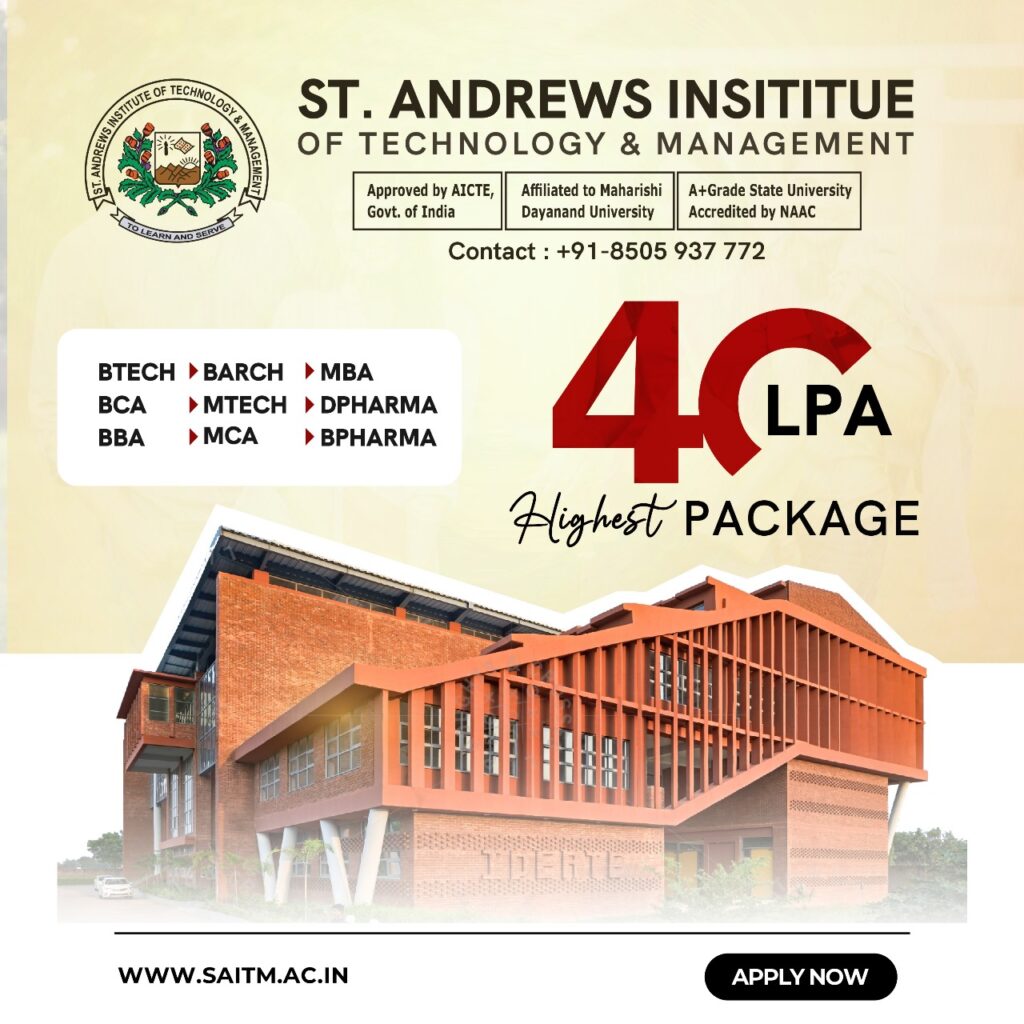
Image – 11 Courses Overview
Some of the prominent scholarships available for MBA courses in India include:
Government Scholarships
Various government bodies at the central and state levels provide scholarships for management students based on merit or specific criteria. Examples include scholarships offered by the Ministry of Minority Affairs, Ministry of Social Justice and Empowerment, and state governments.
Corporate Scholarships
Many companies and corporate organizations offer scholarships to MBA students, especially to those who demonstrate academic excellence or have a background relevant to the company’s industry. These scholarships may also come with internship opportunities or job offers upon completion of the MBA program.
University Scholarship
Many universities and business schools in India provide scholarships in MBA fees to students, awarded on the basis of merit, financial requirements, or other specified criteria. These scholarships may partially or fully cover tuition fees and could also encompass supplementary benefits like stipends or research grants.
Non-Governmental Organization (NGO) Scholarships
Some NGOs in India provide scholarships to MBA students from disadvantaged backgrounds or those belonging to marginalized communities. These scholarships aim to promote education and empower individuals to pursue higher studies.
Merit-Based Scholarships
Many institutions offer scholarships based on academic merit, including performance in entrance exams such as CAT (Common Admission Test), MAT (Management Aptitude Test), or other MBA entrance exams. Students with exceptional academic records may qualify for these scholarships.
Need-Based Scholarships
Specific scholarships are granted in MBA Fees to students based on their financial circumstances. Applicants must present evidence of their financial situation and could receive aid to cover MBA fees, living expenses, or other educational expenditures.
Specialized Scholarships
Some scholarships are specifically designed for students pursuing MBA specializations such as finance, marketing, human resources, or entrepreneurship. These scholarships may be offered by industry associations, professional bodies, or corporate sponsors.
International Scholarships
In addition to scholarships offered within India, some institutions and organizations provide opportunities for Indian students to pursue MBA studies abroad through scholarships, grants, or financial aid programs. Indian students pursue MBA for diverse career opportunities, skill development, networking, and leadership roles in business, globally and domestically.
MBA Admission Based on the Entrance Examination

Image – 12 Inside View of SAITM Campus
Here are some of the prominent entrance exams for MBA admissions:
Common Admission Test (CAT)
CAT is conducted annually by the Indian Institutes of Management (IIMs) on a rotational basis. It is one of the most competitive MBA entrance exams in India and is accepted by various management institutes across the country.
Management Aptitude Test (MAT)
MAT is one of the entrance exams of national-level entrance exam conducted by the All India Management Association (AIMA). It is conducted four times a year (February, May, September, and December) and is accepted by over 600 business schools across India.
Xavier Aptitude Test (XAT)
XAT is one the competitive entrance exams for admission into management programs, assessing verbal ability, quantitative aptitude, and decision making.
Common Management Admission Test (CMAT)
CMAT, managed by the National Testing Agency (NTA), facilitates MBA admission to management programs sanctioned by the All India Council for Technical Education (AICTE). It is conducted annually, typically in January.
MBA Cutoff for Top MBA Colleges

Image – 13 Faculty Achievement
The MBA cutoff for top colleges in India is a pivotal factor in the admission process, reflecting the minimum score required for consideration. These colleges, such as the Indian Institutes of Management (IIMs), XLRI, and others, are renowned for their rigorous academic standards and exceptional faculty.
Cutoff scores vary annually and depend on several factors, including the number of applicants, the quality of the applicant pool, and the institute’s admission criteria. Generally, top MBA colleges set high cutoffs to ensure the selection of the best candidates who demonstrate academic excellence, leadership potential, and relevant experience.
For example, IIMs typically have stringent cutoffs, with percentiles ranging from the 90th to the 99th percentile in entrance exams like CAT. Similarly, other top colleges may have cutoffs corresponding to high percentiles in exams like XAT, CMAT, or MAT.
Candidates aiming for admission to these prestigious institutions must strive to exceed the cutoff scores while also excelling in other aspects of the admission process, such as group discussions, personal interviews, and academic achievements.
Career Opportunities for MBA Graduates
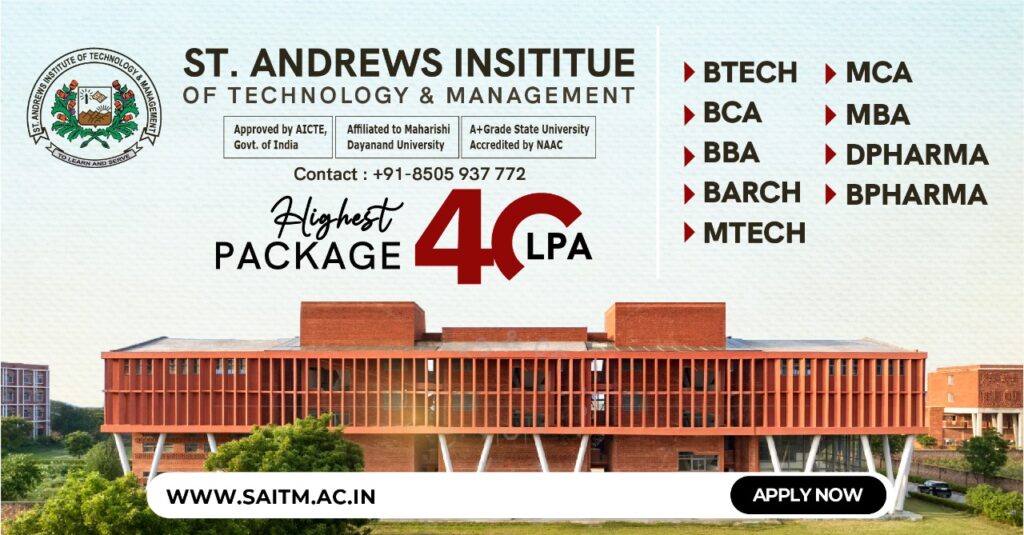
Image – 14 SAITM Courses Overview
Here are some career opportunities for a MBA graduate:
Management Consultant
Graduates with an MBA frequently embark on careers as management consultants, either employed by consulting firms or operating independently. They provide strategic advice to businesses on various aspects such as organizational structure, operations, marketing, and finance.
Financial Analyst/Manager
Individuals holding an MBA degree, particularly those with a focus in finance, can pursue roles as financial analysts or managers within banks, investment firms, or corporate finance divisions. They analyze financial data, develop investment strategies, and manage financial operations.
Marketing Manager
Graduates possessing an MBA degree, particularly those specializing in marketing, can seek positions as marketing managers, responsible for supervising product development, branding initiatives, advertising, and promotional campaigns. They work to understand consumer behaviour and market trends to develop effective marketing strategies.
Operations Manager
Individuals who have earned an MBA, particularly those with proficiency in operations management, can serve as operations managers, responsible for supervising the production and delivery of goods and services. They optimize processes, manage supply chains, and ensure efficient operations to meet business objectives.
Human Resources Manager
Graduates holding an MBA degree, particularly those specializing in human resource management, can assume roles as HR managers, tasked with recruiting, training, and overseeing employees. They develop HR policies, oversee performance evaluations, and ensure compliance with employment laws.
Supply Chain Manager
Individuals who have completed an MBA program, especially those specializing in supply chain management, can pursue positions as supply chain managers. They are accountable for orchestrating the movement of goods and services from suppliers to customers, optimizing supply chain processes, overseeing logistics, and addressing risks.
Top Recruiters

Image – 15 Highest Package
Top Recruiters for MBA Graduates:
- McKinsey & Company
- The Boston Consulting Group (BCG)
- Bain & Company
- Goldman Sachs
- Amazon
- Microsoft
- J.P. Morgan Chase & Co.
- Deloitte
- Apple
MBA 1st Year Subjects

Image – 16 SAITM Campus Food Court
The subjects in the first year of an MBA curriculum are typically crafted to furnish a comprehensive groundwork in enterprise administration principles spanning multiple disciplines.
This part of the program usually consists of core courses that all students are required to take, regardless of their specialization or focus area in the second year.
While specific courses can vary by institution, the first-year curriculum typically includes the following subjects:
Principles of Management
An introduction to the basic concepts, theories, and practices in management, including planning, organizing, leading, and controlling.
Economics for Managers
This course covers fundamental economic principles and how they apply to business decisions, including microeconomic and macroeconomic perspectives.
Financial Accounting
An overview of accounting principles, financial statements, and the financial reporting process, enabling managers to interpret and evaluate financial information.
Managerial Accounting
Focuses on the use of accounting information for internal decision-making, including budgeting, forecasting, and cost analysis.
Quantitative Methods for Management
An introduction to quantitative techniques used in business decision-making, including statistics, operations research, and data analysis.
Marketing Management
Covers the basic principles of marketing, including market research, product development, pricing strategies, distribution, and promotion.
Organizational Behaviour
Studies how individuals and groups interact within organizations, covering topics such as motivation, team dynamics, leadership, and organizational culture.
Human Resource Management:
An overview of HR practices, including recruitment, selection, training and development, performance management, and compensation.
Business Communication

Image – 17 Students Show their Business Ideas
Focuses on enhancing communication skills, including writing, presentation, negotiation, and interpersonal communication, essential for effective management.
Operations Management–
Examines the processes involved in producing and delivering goods and services, including supply chain management, quality control, and logistics.
Information Systems for Managers
Overview of information technology in business, covering topics such as MIS, e-business, and how IT supports business processes.
Business Ethics and Corporate Social Responsibility (CSR)
Discusses ethical decision-making in business, corporate governance, and the social and environmental responsibilities of businesses.
Strategic Management
An introductory course on strategy formulation and implementation, including industry analysis and competitive strategy.
Best MBA Colleges Accepting CAT Score: Location-Wise

Image – 18 Prize Distribution by Manoj Tiwari
Here’s a list of some of the top MBA colleges in India that accept CAT scores, categorized by location:
North India:
- Faculty of Management Studies (FMS), University of Delhi, Delhi
South India:
- Indian Institute of Management (IIM), Bangalore
- Indian Institute of Management (IIM), Kozhikode
- Xavier Institute of Management and Entrepreneurship (XIME), Bangalore
- T. A. Pai Management Institute (TAPMI), Manipal
West India:
- Indian Institute of Management (IIM), Indore
- S.P. Jain Institute of Management and Research (SPJIMR), Mumbai
- Xavier Institute of Management (XIM), Bhubaneswar
East India:
- Indian Institute of Management (IIM), Calcutta
- Xavier School of Management (XLRI), Jamshedpur
- Indian Institute of Management (IIM), Shillong
- Institute of Management Technology (IMT), Ghaziabad
MBA Salary in India
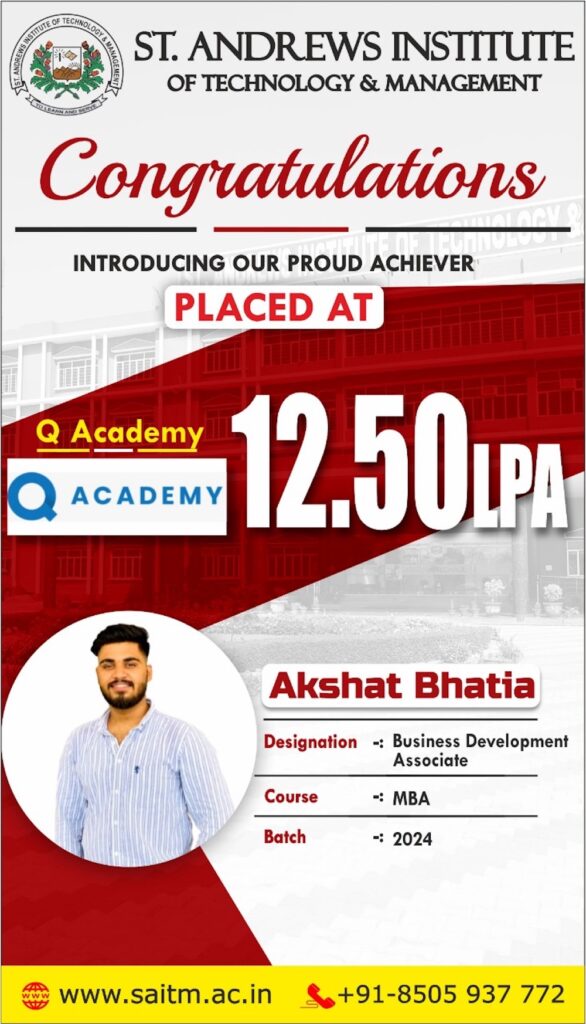
Image – 19 MBA Student Placed at Q ACADEMY
Here’s a general overview of MBA salaries in India across different sectors and job roles:
Entry-Level Positions
Typically, individuals who have completed their MBA begin their careers in entry-level management roles, such as management trainees, business analysts, or associate consultants. Average MBA salary for entry-level positions can vary from INR 5 lakhs to INR 15 lakhs per annum, depending on relevant factors.
Mid-Level Management
With a few years of experience, individuals holding an MBA degree can advance to mid-level management positions such as project managers, marketing managers, operations managers, or senior consultants. Salaries for mid-level management positions can range from INR 10 lakhs to INR 25 lakhs per annum.
Senior Management and Leadership Positions
As MBA graduates gain more experience and demonstrate leadership capabilities, they can advance to senior management roles such as general managers, directors, or executives. Salaries for senior management positions can vary widely but often range from INR 20 lakhs to several crores per annum, especially in top-tier companies and multinational corporations.
Industry and Sector Differences
Compensation for individuals with an MBA degree can also differ based on the industry and sector they are employed in. For instance, professionals working in sectors such as consulting, investment banking, or IT/software frequently receive higher salaries compared to those in industries such as manufacturing or non-profit.
Location
The location of the job can also impact MBA salaries, with higher salaries typically offered in major metropolitan cities such as Mumbai, Delhi, Bangalore, and Hyderabad compared to smaller cities or rural areas.
Bonuses and Other Perks
In addition to base salaries, Individuals with an MBA degree may also receive performance bonuses, incentives, stock options, and other benefits as part of their compensation package, particularly in sectors such as finance and consulting.
Courses After MBA Degree

Image – 20 Project Exhibition at SAITM
Here are some courses and certifications that MBA graduates may consider:
Executive Education Programs
Many business schools offer executive education programs tailored for mid-career professionals seeking to deepen their expertise in specific areas such as leadership, finance, marketing, or strategy. These programs often include short-term courses, workshops, or seminars conducted by industry experts and faculty.
Certifications
Those who have completed an MBA program may seek professional certifications to showcase proficiency in specialized areas or industries. Some common certifications include:
- Chartered Financial Analyst (CFA)
- Project Management Professional (PMP)
- Certified Management Accountant (CMA)
- Six Sigma Certification
- Digital Marketing Certifications (e.g., Google Ads, HubSpot)
- Human Resources Certifications (e.g., SHRM-CP, PHR)
Ph.D. in Business Administration
For individuals interested in research and academia, pursuing a Ph.D. in Business Administration or a related field may be an option. A Ph.D. program typically involves advanced coursework, independent research, and the completion of a doctoral dissertation.
Postgraduate Diploma Programs
Some institutions offer postgraduate diploma programs in specialized areas of business such as data analytics, supply chain management, entrepreneurship, or international business. These programs provide advanced training in specific domains and may be shorter in duration compared to a full-fledged MBA.
Professional Development Workshops and Seminars
Those who have earned an MBA degree can participate in workshops, seminars, conferences, and industry events to remain abreast of the latest trends, best practices, and innovations in their field. These events provide opportunities for networking, learning from industry experts, and exploring new career opportunities.
Language Courses:
In today’s globalized business environment, proficiency in foreign languages can be valuable, especially for individuals interested in international business or cross-border roles.
Online Courses and MOOCs
There is a wealth of online courses and Massive Open Online Courses (MOOCs) available on platforms such as Coursera, edX, Udemy, and LinkedIn Learning.
Industry-Specific Training Programs
Depending on their career aspirations and industry of interest, Individuals who have completed an MBA program may find value in industry-specific training programs, workshops, or boot camps tailored to offer hands-on experience and practical insights into particular sectors like healthcare, technology, finance, or hospitality.
Top Private MBA Colleges with Fees in India

IMAGE – 21 SAITM Management Block
Here are some of the top private MBA colleges in India along with their approximate fees:
Indian School of Business (ISB), Hyderabad and Mohali:
Fees: INR 25-35 lakhs (for the entire program)
SAITM – ST. Andrews Institute of Technology and Management
Fees: INR 3 lakhs (for the entire program)
SP Jain Institute of Management and Research (SPJIMR), Mumbai:
Fees: INR 17-20 lakhs (for the entire program)
Management Development Institute (MDI), Gurgaon:
Fees: INR 20-23 lakhs (for the entire program)
Indian Institute of Foreign Trade (IIFT), Delhi and Kolkata:
Fees: INR 16-18 lakhs (for the entire program)
International Management Institute (IMI), Delhi:
Fees: INR 17-20 lakhs (for the entire program)
Great Lakes Institute of Management, Chennai:
Fees: INR 15-18 lakhs (for the entire program)
Top Government MBA Colleges with Fees in India

Image – 22 SAITM Boys Hostel
Here are some of the top government MBA colleges in India along with their approximate fees:
Indian Institutes of Management (IIMs):
Fees: IIMs have varying fee structures depending on the institute and the program. The total fees for the two-year MBA program typically range from INR 10 lakhs to INR 25 lakhs.
Faculty of Management Studies (FMS), University of Delhi
Fees: FMS Delhi is known for its relatively low fees compared to other top MBA colleges. The total fees for the two-year MBA program are approximately INR 1.92 lakhs for Indian nationals and INR 2.83 lakhs for foreign nationals.
Jamnalal Bajaj Institute of Management Studies (JBIMS), Mumbai
Fees: JBIMS is a prestigious government MBA college in Mumbai. The total fees for the two-year MMS program are approximately INR 3 lakhs.
Indian Institute of Foreign Trade (IIFT), New Delhi and Kolkata
Fees: The total fees for the two-year MBA (IB) courses are approximately INR 16 lakhs for Indian nationals.
FAQs
What is MBA?
MBA full form Master of Business Administration, is a graduate degree that provides advanced knowledge in business management, including finance, marketing, and strategy, to prepare students for leadership roles in various industries.
What is qualification for MBA?
The typical MBA qualification includes a bachelor’s degree in any discipline from a recognized university or institution. While there is no specific undergraduate major required for admission, candidates are often expected to demonstrate strong academic performance and analytical abilities. Moreover, many MBA courses prefer candidates with some level of work experience, typically ranging from 1 to 5 years, although this requirement can vary depending on the course.
Which MBA Specialization has highest salary?
MBA specialization with the highest salary potential in MBA courses often varies based on industry demand, market trends, and individual career goals. However, traditionally, Specializations within the MBA course, such as Finance, Consulting, and Technology Management, are renowned for providing lucrative salary prospects.
Graduates with a specialization in Finance often secure lucrative roles in investment banking, corporate finance, and private equity, commanding substantial salaries. Similarly, consulting professionals with an MBA background often command high salaries owing to their proficiency in offering strategic guidance to businesses.
What is the cost of an MBA course?
The cost of an MBA course varies widely depending on factors such as the reputation of the business school, program format, duration, and additional expenses. On average, the total cost of an MBA program can range from ₹5 lakhs to ₹25 lakhs or more in India.
This includes tuition fees, accommodation, books, materials, transportation, and living expenses. Additionally, there may be other costs such as application fees, examination fees, and travel expenses for internships or study trips. Scholarships, financial aid, and student loans may be available to help offset the cost of an MBA course for eligible students.
Is MBA a 2 year course?
Indeed, traditionally, an MBA course spans over two years. This duration is structured to equip students with a thorough comprehension of diverse business disciplines and to ready them for leadership positions in the corporate realm.
What is the full form of MBA ?
The MBA full form signifies “Master of Business Administration,” a distinguished postgraduate degree. This program delves deeply into diverse aspects of business management, covering finance, marketing, operations, human resources, and strategy.
It aims to furnish students with advanced skills and knowledge essential for excelling in leadership roles within organizations or initiating entrepreneurial endeavors. In general, MBA studies commonly integrate classroom instruction, case analyses, collaborative projects, and internships to provide hands-on experience and refine critical thinking skills.
Master of Business Administration graduates frequently enter professions in consulting, finance, entrepreneurship, or general management. They leverage their MBA course to foster innovation and drive accomplishments in the continually evolving business environment.
What is the work of MBA?
The work of an individual with an MBA ( Master of Business Administration) degree can vary widely depending on factors such as their specialization, industry, job role, and level of experience.
However, broadly speaking, those who have attained an MBA degree possess a diverse range of skills and knowledge that can be applied across various domains of business administration and leadership.
Individuals with an MBA degree are esteemed for their analytical prowess, problem-solving aptitude, strategic acumen, and leadership promise, rendering them adaptable professionals capable of steering organizational success across a broad spectrum of industries and sectors.
Is there MBA after 12th?
Normally, individuals do not have direct access to MBA studies immediately after completing their 12th grade or high school education. MBA (Master of Business Administration) courses are designed for individuals with prior undergraduate education and some level of work experience.
The typical path to pursue an MBA involves completing a bachelor’s degree first, gaining some work experience, and then applying for admission to an MBA program.
What is the eligibility for MBA?
Eligibility criteria for MBA courses typically include a bachelor’s degree from a recognized university or institution. While there is no specific undergraduate major required, candidates are often expected to demonstrate strong academic performance and analytical abilities.
Eligibility criteria for MBA typically include a Bachelor’s degree, entrance exam test scores (CAT), preferred work experience, letters of recommendation, and a statement of purpose.
Numerous MBA offerings prioritize candidates possessing a certain degree of professional experience, often spanning from 1 to 5 years, although this prerequisite may differ based on the specific program.
Certain MBA pathways might also demand that applicants undertake entrance exam like the CAT, in addition to submitting letters of recommendation and a statement of purpose. In general, eligibility criteria can differ among educational institutions and their respective offerings.
What is the average MBA salary ?
The average MBA salary starts from salaries ranging from ₹6 lakhs to ₹25 lakhs per annum. Graduates from top-tier business schools or with specialized skills in fields such as finance, consulting, or technology tend to command higher salaries.
Should I even pursue an MBA? Why MBA?
Aspiring to pursue MBA empowers individuals to cultivate a comprehensive skill set encompassing finance, marketing, operations, and leadership, nurturing career advancement and unlocking pathways to higher positions and increased earning potential.
Furthermore, MBA studies provide invaluable networking avenues, facilitating the establishment of connections with fellow students, faculty members, alumni, and professionals within the industry. Concentrations in areas such as entrepreneurship and innovation furnish aspiring business proprietors with resources and specialized knowledge.
The international facets of the curriculum equip graduates with a global outlook, preparing them to navigate the intricacies of the interconnected business environment prevalent today.
What are the Topmost Universities for an Online MBA?
Narsee Monjee Institute of Management Studies (NMIMS) Distance Education
Offers an online MBA program with specializations in areas such as banking and finance management, human resource management, marketing management, and supply chain management.
ICFAI University
Provides an online MBA program with various specializations, including marketing, finance, human resource management, operations, and IT & systems.
University of Mumbai – IDOL
The Institute of Distance and Open Learning (IDOL) offers an online MBA program recognized for its quality education and flexibility for working professionals.
How is Distance and Online MBA beneficial?
Distance and online MBA courses offer several benefits to working professionals and individuals seeking career advancement. They provide flexibility, allowing students to balance their studies with work and personal commitments.
Distance and online MBA offerings also draw a varied group of students, creating advantageous networking prospects. Moreover, they enable individuals to obtain an advanced degree without the necessity of relocation or career interruption, rendering them a pragmatic and convenient choice for those aiming to augment their business acumen and competencies.
Distance MBA programs offers remote learning option for flexible business education pursuits. Online MBA offers Advance career with flexible online MBA programs for professional development.





